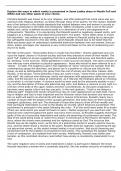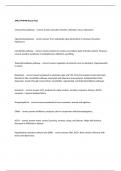Explore the ways in which vanity is presented in Some Ladies dress in Muslin Full and
White and one other poem of your choice.
Christina Rossetti was known to be very religious, and often believed that moral value was syn-
onymous with religious devotion, as shown through many of her poems. For this reason, Rossetti
was a firm believer in the double standards that existed between men and women in society as
they were presented in the bible and Christianity. Within christianity, pride is one of the seven
deadly sins; vanity is defined excessive pride in or admiration of one's own appearance or
achievements. Therefore, it is unsurprising that Rossetti would’ve negatively viewed vanity, and
pegged it as a religious sin that deserved punishment. The poem, ”Some ladies dress in muslin
full and white,” was written as a response to a letter written to Rossetti asking her to advocate
the suffragette movement in the late 1870s, which Rossetti refused due to her belief that the
Bible was based upon an understood unalterable distinction between men and women, their po-
sition, duties, privileges. Her response is very critical and takes on the role of condemning soci-
ety for its faults.
The title of the poem, ”Some ladies dress in muslin full and white,” directly addresses and criti-
cizes the higher classes in Victorian society and how they dressed to show off their wealth. The
word "full" implies an excess suggesting that this is unneeded and wrong, and therefore waste-
ful. Similarly, in the next line, ‘Some gentlemen in cloth succinct and black,’ the same criticism of
men who pay extra attention to physical appearance - those who would’ve been referred to as a
‘dandy’ - is made. The anaphora used in the repetition of ‘some’ removes the narrator from the
contemptuous group she describes, and places her in a position to criticize and ridicule this
group, as well as distinguishing this group from the rest of society and the other classes. Addi-
tionally, in the phrase, "Some patronise a dog cart, some a hack, / Some think a pained clarence
only right” the satirical tone dismisses vanity and obsession with appearance rather than practi-
cality, and the sarcasm is a swipe at materialism, as it ridicules the emphasis placed on choosing
a cart which is a trivial matter. A clarence would’ve been used by the extremely wealthy in soci-
ety, and the description of those who patronise dog carts, and believe a clarence is only right is a
criticism of the pride of the upper classes and their conceitedness. As the poem progresses, it
becomes more openly critical and less sarcastic. In the next quatrain, ”Youth is not always a
pleasing sight” implies that society should focus less on outer appearances as looks fade. Focus-
ing on religion and God is most important and the Victorian notion that devotion and renuncia-
tion on earth will lead to an eternal life with God in heaven Critical tone. Rossetti clearly has a
number of issues with the people of the younger generation. She looks down on them as being
indulgent, gluttonous, and vain. The dismissal of those who dress to show off their wealth and
their portrayed materialism is a link to the deadly sin of pride, which deserves punishment. This
punishment is portrayed in the sestet following the volta - ‘If all the world were water fit to drown
/There are some whom you would not teach to swim, / Rather enjoying if you saw them sink.’ The
satyrical tone used throughout the poem now turns more vicious, as Rossetti suggests that those
guilty of the sin of excessive materialism and vanity are deserving of punishment and death. The
idea of the world being made of ‘water fit to drown’ is reminiscent of the Flood in the Noah’s Ark
story, where the sinners were drowned and the righteous saved by God. The structure that
Rosetti has use dis slightly ironic, as the form of a petrarchan sonnet is usually used for love po-
ems, and the sestet shows a resolve to the poem. Rossetti does the opposite, subverting the typ-
ical petrarchan sonnet, as this sestet instead implies a cruel resolve - that social cleansing and
punishment will fix the problem of consumerism and vanity. This symbolises the speaker feeling
a lack of compassion, and isolated from their society. Additionally, Rossetti uses iambic pen-
tameter, as this controlled structure could reflect how society is consistently materialistic to no
end.
The same negative view of vanity and materialism is taken is portrayed in Babylon the Great.
Rossetti describes a woman who is outwardly beautiful. She has endless amounts of material as-





